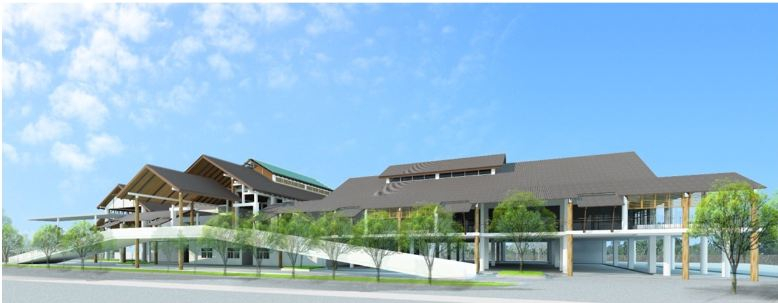Thailand faces up to ageing population with new Geriatric Centre

Thailand faces up to ageing population with new Geriatric Centre
In 2020 – just three years away - Thailand will be classified as a full-blown ageing society with 20 per cent of total population over the age of 60. Among the institutes gearing up for this change is Siriraj Hospital, which has just launched The National Academic Centre of Geriatric Medicine. This will serve as the first knowledge centre for geriatric care as well as undertake research into how this can be improved.
Construction of the centre, which is located on 24-rai (9,600 sqm) of donated land in Samut Sakhon, is scheduled to start this year with an investment of Bt1.8 billion.
The centre is divided into two phases, with the first phase expected to be completed in 2020 and the second to be built between 2020 and 2021.
“The government has approved a budget of Bt600 million for the first phase so we need another Bt1.2 billion. We aim to raise funds to complete the project,” says Assoc Prof Dr Visit Vamvanij, the director of Siriraj Hospital.
The centre will comprise a research centre, an outpatient building, two inpatient buildings, a geriatric rehabilitation centre and related supportive buildings including staff dormitories.
“This facility will offer intermediate care (sub-acute care) not primary care. It is not a hospital where the elderly can come if they are ill. They should be treated at a general hospital like Siriraj or Samut Sakhon hospital first. When they recover but require more rehabilitation, they will be sent here before being discharged,” says Dr Visit.

Intermediate care or sub-acute care refers to the process of helping patients who are no longer sick enough to remain in hospital but too unstable to be treated at home. Training will be provided for caregivers or family members in how to take care of their elders at home and will also include the adjustments that need to be made to dwellings. The training service is designed to facilitate the transition from hospital to home, and from medical dependence to functional independence, where the objectives of care are not primarily medical.
This is seen as particularly important as all too often a spell in hospital will require adjustments to the home so the elderly can live more independently when they are discharged. Thailand has no system in place to advise on such adjustments and the care needed and hospitals are forced to discharge patients as quickly as possible to make room for new admissions. The centre is aiming to fill that gap and make life in a multi-generational family not just safer but also happier.
Dr Visit adds that the centre is totally designed for elderly care and will include special inpatient rooms for those suffering from dementia and will as the standard ramps and rails.
The OPD will provide services for those receiving medication from the hospital but are not yet ready to return home as they need more rehabilitation and preparation, and treatment will be geared to such geriatric syndromes as dementia, delirium, falling and depression. The centre will also have a Geriatric Day Clinic that provides daily rehabilitative care with patients able to return home in the evening. The principle is similar to a daycare centre for kids and allows caregivers to drop off the elderly when they are not available on certain days.
Dr Visit says that the first phase will include the outpatient building, inpatient building and staff dormitory and the research centre and rehab will be in the second stage.
“We will start operating right after its facility is ready. As soon as the outpatient is built, we will start operations. We won’t wait for the whole centre to be complete,” he adds.

“Families are happy when their senior members are healthy both physically and mentally. And nothing makes them happier than knowing that their offspring are taking care of them,” says Prof Dr Prasit Watanapa, dean of Faculty of Medicine, Siriraj Hospital, Mahidol University.
Dr Prasit adds that Siriraj Hospital has been working towards geriatric medicine for 25 years. The faculty started to produce geriatricians as well as medical professionals from nurses to physical therapists. The faculty has also worked with National Center for Geriatric and Gerontology, Japan in preparation for entering the complete aging society in 2022.
“Certainly we have to apply their knowledge to use in Thai context,” says Dr Prasit.
“Why do we have to have geriatric medicine? Because the illnesses of old people are different from patients at a younger age,” says Professor Prasert Assantachai, Deputy Dean and Head of Geriatric Medicine.
Deterioration in physical and mental health starts with the appearance of grey hair and can later develop into delirium, falls, incontinence and frailty. Many elderly are taking multiple medicines and the side effects must be controlled. Dementia will be one of the most prevalent diseases in Thai society in the near future because it is more common with increasing age.
“In the past, those symptoms were diagnosed as senility. The goal of geriatric medicine is to fill in knowledge about the specific needs of the elderly. If we are passive it will be a big problem. The difficulty is expertise in multidisciplinary care and Siriraj has been working on it for years,” says Dr Prasert.





